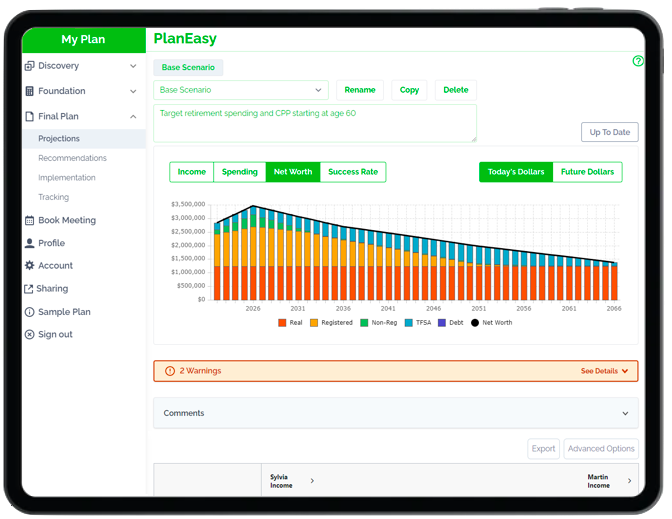TFSA Beneficiary vs Successor Holder? The difference is HUGE!
We’re always told to make sure we have beneficiaries designated on all our accounts. We’re told to make sure that our beneficiaries are in accordance with our final wishes and we’re also told to review them regularly.
But when it comes to the TFSA there is another, more important designation, the successor holder, and in some cases we don’t want to list a beneficiary on our TFSA we want to list a successor holder instead.
There are lots of benefits to having a beneficiary (or successor holder) designated on your account. It helps expedite things after you pass. It helps your loved ones access cash and investments faster. It helps avoid probate fees. And it helps keep assets from entering the estate and getting held up in the estate process.
Having a beneficiary also helps to keeps things private. When you don’t have a beneficiary list on your account, your assets pass through your estate. Estate information is available to the public, so any assets passing through your estate are out there available for everyone to see. By naming a beneficiary on your account, the assets in that account avoid your estate and go directly to the beneficiary. They’re kept private and no one knows the details.
But when it comes to the TFSA there is another designation that you can make on your account. The difference is subtle, but like many things in personal finance the impact can be HUGE.
When it comes to the TFSA you can designate someone a beneficiary but you can also name someone a successor holder.
Here’s the difference…
Related Posts:
Beneficiary vs Successor Holder
For any TFSA you can name a beneficiary but you can also name a successor holder. You can do one, the other, or both.
The best way to describe the difference is that a beneficiary would get the money, but a successor holder would get the account.
That means that a beneficiary of a TFSA would receive all the money within the TFSA tax-free but then the TFSA would get shut down. A beneficiary will lose all that tax-free space. Unless the beneficiary has TFSA contribution room available they will start to be taxed on any investment gains going forward.
A successor holder on the other hand would receive the account with the money inside it. A successor holder would get to keep all that tax-free room. The TFSA is now theirs. If they make a withdrawal they would get that contribution room back the next year. That’s amazing!
The TFSA is a powerful account, it can be used to fully fund retirement, or it can be used to help optimize government benefits. We definitely want to keep that TFSA room if we can.
Not everyone can be named a successor holder. Only spouses and common law partners can be named a successor holder.
Brothers, sisters, parents, children, friends etc can be named a beneficiary on a TFSA but not a successor holder.
Blog post continues below...
Advice-Only Retirement Planning
Are you on the right track for retirement? Do you have a detailed decumulation plan in place? Do you know where you will draw from in retirement? Use the Adviice platform to generate your own AI driven retirement decumulation plan. Plan your final years of accumulation and decumulation. Reduce tax liability. Estimate "safe" vs "max" retirement spending. Calculate CPP, OAS, GIS, CCB etc. And much more!
Start your retirement plan for just $9 for 30-days!
You deserve financial peace of mind as you enter retirement. Start planning now!

“I’m Married But Listed As A Beneficiary, Am I Out Of Luck?”
Even if your spouse has accidentally named you a beneficiary and not a successor holder you’re not completely out of luck. There is an opportunity for spouses and common law partners to receive the same rights as a successor holder even if named a beneficiary.
But that opportunity is short and must happen soon after their partners passing. It has to happen by December 31st, the year following their partners passing. And even then, the investment gains between those two points are taxable.
The best thing for spouses and common-law partners to do is list a successor holder.
Check Your Beneficiaries
It’s a good practice to check your beneficiary is on all your accounts periodically. It may have been years since you initially set the beneficiary. Your circumstances may have changed during that time. You may have children, a spouse, a new partner etc. If you have a spouse or common-law partner make sure that your designated them a successor holder on your TFSA. It’ll make things that much easier for your partner.
Join over 250,000 people reading PlanEasy.ca each year. New blog posts weekly!
Tax planning, benefit optimization, budgeting, family planning, retirement planning and more...
Join over 250,000 people reading PlanEasy.ca each year. New blog posts weekly!
Tax planning, benefit optimization, budgeting, family planning, retirement planning and more...






An Ontario married couple with RRIPs and they have designated each other as Successor Annuitant/Owner of their RRIFs. In the event of the first one passes away the surviving spouse will assume the account of the deceased spouse. They (their estates) will have to pay the collapsed RRIFs Income taxes should there be a Common Disaster. If they don’t want to pay the Ontario Probate Taxes on the collapsed RRIFs in the case of a Common Disaster, can they designate their son as the primary beneficiary and their daughter as the secondary beneficiary in additional to designating each other as the SUCCESSOR ANNUITANT/OWNER of each other’s RRIFs?
Hi Fred, some financial institutions allow for secondary beneficiaries, and this can be a good strategy to avoid probate (especially in Ontario with its high probate fees), however this strategy might not be for everyone and it may not fit into your estate planning goals. In this article, Jason Heath does a good job at explaining why you may not want to add children as secondary beneficiaries on your RRIF.
A husband and wife each have a TFSA. He has maxed out his contributions to his TFSA, she has not. Each are named successor annuitant on the other’s TFSA. Husband passes away. Wife then receives his account, merges it into hers. She then tops it up with her unused TFSA contribution room so she’s now maxed out. Later that same year (same year of death, same year she topped up her account) she makes a full withdrawal of all the money, let’s say now worth $150,000. She can then recontribute that $150,000 the following calendar year, plus her new limit for that new year, is that all correct? thx
Hi JP, you’re correct that once the successor holder takes ownership of the TFSA that they can make withdrawals from the account tax free and that contribution room will come back as of January 1st the following year, but I always recommend that people check their TFSA contribution room on their myCRA portal before making a contribution to TFSA and RRSP.
TFSA beneficiary vs. successor holder. Why wouldn’t a joint account be just as good?
Hi Ed, good question, a joint account would be a taxable account, there is no such thing as a “joint TFSA” unfortunately. Investing a taxable account would be less attractive than investing in a TFSA so we’d prefer to use up all the TFSA contribution room we can and then ensure those assets pass on in the right way if the unfortunate were to happen.
Hi, I’m wondering how does Beneficiary or Successor work if I’m single and have no spouse/common-law partner/child/grandchild, and I would like to have my parents as Beneficiary or Successor, is that an option?
Hi CJ! The successor holder designation only applies to spouses or common-law partners, but you can use the beneficiary designation for anyone.
I am a beneficiary on my deceased moth‘s RIF. I have cashed the account in and received the funds. I have received a T4RIF. I am confused as to who should be declaring this income on their tax return- should I or should it be on mother’s final return?
Hi Eva, I’m very sorry for your loss, you are correct that typically this amount is declared on the final return, however every situation is different we would recommend speaking with an accountant or tax professional about filing the final return.
I’m still a bit confused. I am married with children. My spouse is my success holder and I currently have my mother as the beneficiary. Ultimately I want the money to go to my wife if I pass and if not, then my kids. Should I list my wife as both success holder and beneficiary? Should I list her as success holder and then my kids as beneficiary along with my wife? Please advise.
Hi Mel! It’s important to make these estate planning decisions within the context of your entire estate plan. Sometimes there can be unintended consequences of listing certain people as beneficiary or successor holder. Reviewing your will and estate plan with a lawyer can help avoid these unintended consequences. For example, if you have three children and you list your children as beneficiary but one predeceases you then the TFSA would be split by the two remaining beneficiaries. This may not be your intention as you may still wish you split the TFSA among the three families/grandchildren etc. It’s best to review your plan with a lawyer who can advise on these potential pitfalls.
If you have named a spousal successor can you also have your children as beneficiaries? I was under the impression it was one or the not not both
Hi Adam! Many TFSAs allow both a successor holder and beneficiaries to be listed. However, the beneficiary designation will only take effect if the successor holder has passed away.
“For any TFSA you can name a beneficiary but you can also name a successor holder. You can do one, the other, or both.”
So technically you can’t name both – you can only name “contingent beneficiaries” alongside a successor holder.
Can the Tfsa account be transferred to the spouse in a successor holder even if spouse tfsa is full?
Hi Gilbert, yes, this is the benefit of having a spouse as the successor holder on a TFSA, they’ll get the TFSA and it will not impact their contribution room.
hi Owen,
What happens when the TFSA is locked into a term GIC? If I am the beneficiary do I have to wait until the term is up in order to access the money? Will I pay tax on the interest gained during that term?
Hi Kathryn, the process is different for a beneficiary versus a successor holder so you’ll want to reach out to the financial institution to understand what the process is.
If I designate my spouse as being my successor to my TFSA, does she also inherit future allowable contributions to it in future years?
Hi Harvey, a spouse who is a successor holder will only inherit used contribution room, any unused contribution room will be lost. If a TFSA is maximized each year then a spouse will inherit the full TFSA. A spouse will continue to earn new TFSA contribution for their TFSA only.
So the main benefit of designating a successor is to create an easy flow of the deceased TFSA to the successor and still maintain both spouses TFSAs while avoiding probate?
Yes, although it can work out the same in the end, there are a couple of nuances if a spouse is not listed as successor holder. For example, if a spouse is listed as a beneficiary, although the spouse can eventually receive the same rights as a successor holder if they file the appropriate paper work, the investment gains between the date of death and the date they receive ownership are now taxable.
Naming a spouse a successor holder just makes things easier if the intention is that they should receive the TFSA anyway.
One last question, Owen, and thank you for your replies.
If the spouse is listed as the successor holder, is it assumed that the transfer of the account happens the same day as the death of the original holder and therefore there would be no tax implications? I guess one last question, is there any paper work involved to make this seamless transfer or does my TFSA carrier do this automatically upon death? Thanks again.
Will the transfer of TFSA happen automatically upon death, to my successor holder so as there won’t be a lapse in the securing of TFSA to insure tax would not occur waiting for ownership transfer? Are there forms that need to be completed or will the successor holder have to be notify the TFSA carrier? How would the carrier (CIBC) be notified of the death? I guess my questions are somewhat entangled but Clarification of the process is required.
Thank you.
Hi Harvey, its best to discuss the details with your financial institution, but typically they will require notice and a Death Certificate before they can transfer ownership of the accounts. Again, best to speak with your financial institution about their process.
My brother named a beneficiary to his TFSA account. I am the administrator of the estate and I have tried to locate the beneficiary to no avail. The bank tells me it’s my responsibility to locate the beneficiary and if I cannot, the bank will receive the funds in the TFSA, not the estate. Is this correct?
Hi Colleen, unfortunately I cannot provide any guidance and I would recommend speaking with an estate lawyer about the process.